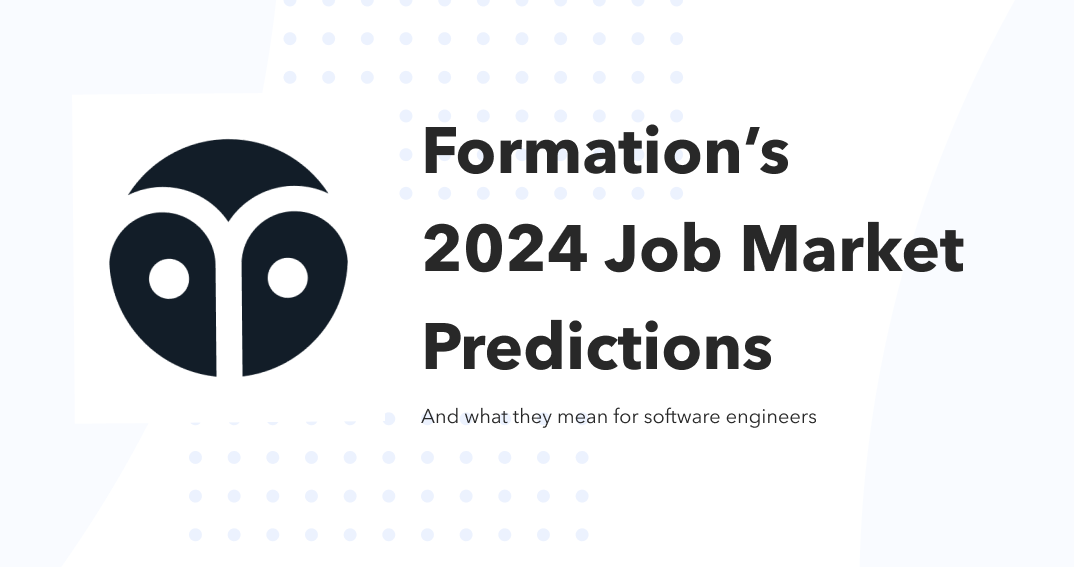Why a smaller startup is the perfect place to grow your SWE career right now
Right now, FAANG companies are not the best place to grow your career; Series A (and later) startups hold that title.

This blog post is part of a series designed to make navigating the current tech job market more approachable. In this series, technical recruiters, career coaches, and engineering hiring managers are sharing industry insights and advice for software engineers on the job hunt. For all posts in this series, head to the Navigating the Job Market page.
Although it may not seem obvious looking at my LinkedIn, I took a bit of a non-traditional path to get where I am today. My past experience includes over 6 years of software engineering experience, notably three years at Meta and just over a year at Uber Freight. One thing I’ve learned is that while experience at FAANG companies can be great for a resume, it isn’t an indicator of intelligence. While very valuable, working at FAANG doesn't guarantee that an engineer will be a great fit for every role.
Including “ex-[insert FAANG company here]” in your LinkedIn bio or resume has value, but I believe it is not as impactful as it used to be. As a Mentor at Formation, I’ve met some Fellows with little to no engineering experience at FAANG companies who I would gladly refer to any company I work for. Right now, FAANG companies are not the best place to grow your career. Why? Let me explain.
My nontraditional background
Before I dive in, I'll provide a little context as to why I think startups are the best place to grow your career right now. Before I was a software engineer, I studied electrical engineering at UCLA. After an atrocious hardware engineering internship experience the summer before my senior year, I decided that I wanted to pivot into software. I managed to squeeze a few foundational CS classes into my schedule during my senior year, but I had a tremendously difficult time getting any attention from recruiters compared to computer science majors.
I heard about a full-stack coding bootcamp called Hack Reactor from a friend; even though it was going to cost me quite a bit of money, it seemed worth it if I could land a solid gig afterward. I joined a similar bootcamp called App Academy, built a network, learned popular hard skills like React, and landed a front-end job as my first role at a late-stage startup called Hightail. The company laid off ~60% of its workforce within four months of my start date; in no time, I was the only frontend engineer remaining.
While that was unfortunate for several reasons, it was a unique opportunity in disguise. Having recently started my career, I had an entire codebase to myself where I could learn by doing. I truly felt like this opportunity allowed me to grow 2-3 years’ worth of experience in a single year.
My FAANG experience
A few months later, a friend referred me to a role at Facebook. I crammed for interviews as if it was finals week in college and am pretty confident that I barely passed. I didn’t have the type of guidance that we offer here at Formation, but given the company’s aggressive hiring goals, my seemingly mediocre performance did the job at the time. In my three years at (then) Facebook, I learned a few things the hard way, eventually became a team lead, got promoted, and grew my skillset significantly. I’m one to always keep a pulse on the market and see what’s out there, but once I truly plateaued, I decided it was time for a change. My old PM was at Uber Freight at the time and happily referred me. I was deciding between three fresh offers: Uber Freight, Roblox, and Samsara. Through a financial lens, there was no way I could turn down the Uber Freight offer. It was extremely gratifying that the hard work over the years had materialized into what it did.
Although I took a roundabout way to arrive where I am today, I am grateful for the experiences I’ve had. I would not change a thing if I could go back, and I truly believe I’m a better engineer for it. The point I’m trying to make here is that jumping directly into FAANG isn’t always the best or fastest way to grow your career. If you’re willing to work hard and play the market frequently (but carefully), you can land opportunities that will help you grow even faster than you could have imagined.
How to adapt to the current market
If you’re an engineer early in your career, right now is not the time to be shooting for FAANG or bust. You may want to consider something similar to the path I took; here’s some advice I can offer to those who are beginning their careers in this difficult time:
- Expand your search beyond FAANG, FAANG-adjacent, and even well-known smaller companies. There are literally thousands of companies hiring right now through Wellfound (formerly AngelList) and I very often suggest this approach to Formation Fellows I work with. There are some great companies hiring that you’ve probably never heard of!
- Find companies that have raised in the last ~6 months, ideally Series A or later. These companies are probably actively hiring, and their listed headcount is likely a real reflection of what they actually need. Growing companies are generally more willing to take a bet on less experienced talent as compared to seed-staged companies; See my other post where I touch more on seed-stage startups and why they don’t have this luxury.
- Play the numbers game! Don’t be too selective when applying. Even if you’re not sure if you’ll like a certain role/team/company, apply anyway. As candidates, we don’t have the leverage we had over the last 5 years, so I’d suggest giving everything a chance until you decide it’s 100% not the right fit. For reference, I applied to 336 companies to land my first job.
- Don’t limit yourself to FAANG simply because that's your dream. Don’t ever let anybody take away your dream, but do realize that it sometimes takes multiple stepping stones to reach the end goal. Open roles in FAANG are scarce right now, and more layoffs are likely coming. In addition to that, there’s little to no room for salary negotiation in this market, and average offer sizes have come down closer to earth. Even if FAANG is part of your 5-10 year plan, I wouldn’t recommend making it your top priority at this exact moment.
3 benefits of joining a startup right now
When I accepted an offer from a startup right after App Academy, I had little idea of what I was looking for. All I knew is that I wanted a SWE job with a decent salary where I could learn. In hindsight, I got exactly what I needed to propel my career forward: owning an entire codebase, leveraging my experience to land my next role at Facebook, and growing continuously. All of this was enabled by taking a chance on that startup. Here are three benefits to joining a startup as a software engineer right now:
- Lots of open, impactful roles. Series A and later startups have more control over their spending right now, especially those that have raised money recently. They probably didn’t hire irresponsibly over the last several years the way that FAANG-sized companies did. Generally speaking, the headcount for a company of this size is very intentional. If you get hired, you probably will not be on some “fluff” team; this is something you can’t assume is the case at very large companies.
- More realistic offers and future. In addition to the fact that companies are now more careful and intentional about hiring, the valuations are converging much closer to reality than what we’ve been hearing and seeing in the stock market and otherwise. Smaller startups could have better options and more realistic exits, something most people don’t think about when applying. Series A and B companies generally have found some form of product market fit and are trying to scale; for early careers, that’s a great place to be! I would have loved to know that at the start of my career. Although I am optimistic about most FAANG companies and their futures, it’s unrealistic to expect them to grow at the pace they did over the last 5-10 years forever. We’re now seeing the results of unsustainable growth - mass layoffs.
- Better career growth. In 10 years, a different set of companies will be the face of tech - these companies are likely startups that exist right now. Smaller companies mean less fluff and less fluff means you’ll work on an impactful team. Working on an impactful team will help you grow your career exponentially. While initial compensation at a startup won’t match FAANG in most cases, remember that there’s rarely a perfect first job! Every role is a learning opportunity and a stepping stone to take your career in the direction you want to go.
Kicking my career off the ground at a startup helped me grow faster than I could have imagined. I’ve learned an incredible amount at every company I’ve worked for, and I’m continuing to learn in my current role at a seed-stage startup. The job market is simply unideal right now, and FAANG-sized companies that grew too fast are the toughest to land jobs at right now. The sooner you embrace this and open your mind to smaller companies, the sooner you’ll be able to launch your career.
If you’re looking for some structured support while you prepare for interviews, consider joining our Fellowship. You’ll work with senior engineering mentors, like me, and train efficiently with adaptive learning technology that gets you to your goal. Apply here.



